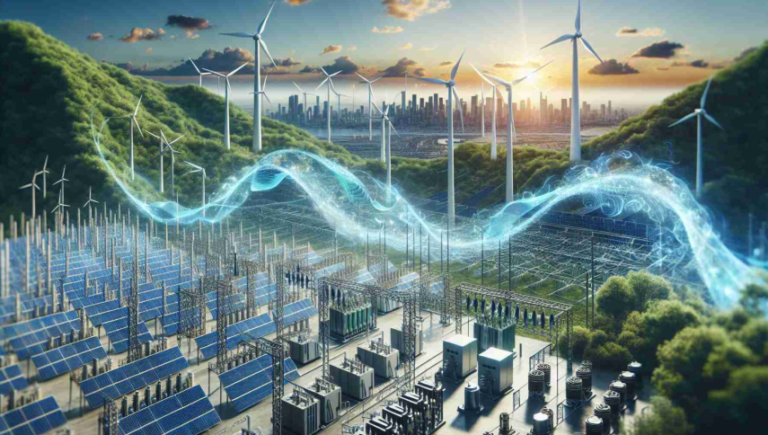
The tech sector is undergoing a transformation as companies increasingly prioritize green technology innovations to reduce their environmental impact and drive sustainability. This movement is not just about mitigating the harmful effects of traditional tech operations; it’s about creating a sustainable future for the industry by adopting renewable energy sources, designing energy-efficient hardware, and integrating artificial intelligence (AI) to optimize energy consumption.
Data centers, which are some of the largest energy consumers in the tech sector, have emerged as a key focus area for renewable energy integration. By deploying on-site renewable energy solutions, such as solar panels, wind turbines, and hydroelectric systems, companies can meet their energy needs sustainably. The adoption of energy storage technologies allows data centers to store excess energy, reducing reliance on fossil fuels and lowering carbon emissions. This transition aligns with global environmental goals and ensures that operations are less vulnerable to fluctuating energy prices.
The quest for energy efficiency has led to significant advancements in hardware design. Low-power CPUs and energy-efficient GPUs are enabling companies to reduce energy consumption without sacrificing performance. Modern semiconductor technologies, such as advanced power management systems, optimize power usage across IT infrastructure. By adopting energy-efficient servers and devices in data centers, businesses can drastically cut operational energy costs while contributing to the global push for sustainability.
Artificial intelligence is taking energy management to the next level. AI-powered systems analyze historical energy consumption data and use predictive analytics to optimize energy usage in real-time. For example, AI can adjust cooling systems, lighting, and equipment operations based on energy demand, leading to significant savings. These systems ensure energy efficiency while maintaining peak performance, promoting sustainable growth within the industry.
Cooling technology accounts for a large portion of energy consumption in data centers. To address this issue, new eco-friendly cooling solutions, such as liquid immersion and adiabatic cooling, are being implemented. Liquid immersion cooling submerges server components in non-conductive fluids to dissipate heat efficiently, consuming less energy than traditional air-cooling methods. Similarly, adiabatic cooling utilizes evaporative processes to cool ambient air, which is then circulated through equipment. These innovations enhance cooling efficiency and reduce water usage, striking a balance between performance and sustainability.
E-waste is one of the most significant environmental challenges facing the tech sector, and biodegradable electronics are emerging as a viable solution. Bioplastics and bio-based polymers, which decompose naturally at the end of their lifecycle, help minimize waste and pollution. Additionally, sustainable materials like bamboo, recycled plastics, and bio-based composites are being used in the manufacturing of IT equipment, reducing the dependence on finite resources and promoting responsible disposal practices.
The adoption of green technology offers multiple benefits for tech companies: Reduced operational costs, enhanced energy efficiency, environmental stewardship, risk mitigation, and a competitive advantage. Energy-efficient solutions and renewable energy sources lead to long-term savings by cutting utility expenses. AI-driven systems and efficient hardware optimize resource use, reducing waste without compromising performance. Green technologies help minimize carbon emissions, supporting corporate responsibility and compliance with environmental regulations. Sustainable practices protect businesses against regulatory changes and market disruptions, ensuring the long-term viability of IT infrastructure. Companies that embrace eco-friendly practices attract environmentally conscious customers and investors, bolstering their brand reputation and market position.
While the benefits of green technology are evident, there are several challenges in its adoption: high upfront costs, technological complexity, resistance to change, and supply chain risks. The initial investment required for energy-efficient hardware and renewable energy systems can be substantial. However, long-term savings and government incentives, such as green loans, can offset these costs. Advanced green technologies require specialized knowledge for implementation and maintenance. Upskilling IT staff and conducting pilot tests can mitigate integration challenges. Employees may resist new technologies due to concerns over workflow disruptions. Providing clear communication and training can help ease these transitions. Sourcing sustainable materials can expose businesses to supply chain uncertainties. Diversifying suppliers and maintaining contingency plans can help manage these risks.
Several leading tech companies are setting benchmarks in green technology adoption. Microsoft, for instance, is a founding member of the Green Software Foundation, a group that promotes climate-first software development. IBM has developed tools like the Green IT Analyser to help companies measure and manage the carbon footprint of their IT estates. Moreover, global tech giants are joining forces in partnerships like Emissions First, focusing on standardized metrics to assess the environmental impact of technology.
Green technology innovations are not just a trend; they are essential strategies for ensuring a sustainable future in the tech sector. By integrating renewable energy sources, designing energy-efficient hardware, and leveraging AI-powered systems, companies can contribute to a greener, more sustainable tech ecosystem. The continued efforts of industry leaders signal a promising shift toward a future where sustainability is at the core of technological progress, benefiting both businesses and the environment alike.
By embracing green technology, the tech industry is poised to lead the charge toward a more sustainable, energy-efficient, and environmentally responsible future. The integration of renewable energy, AI, and sustainable materials is not only improving operational efficiency but also fostering a culture of innovation that prioritizes long-term ecological health. As businesses continue to adopt these green solutions, they are not only reducing their environmental footprint but also paving the way for a more sustainable and prosperous future.







